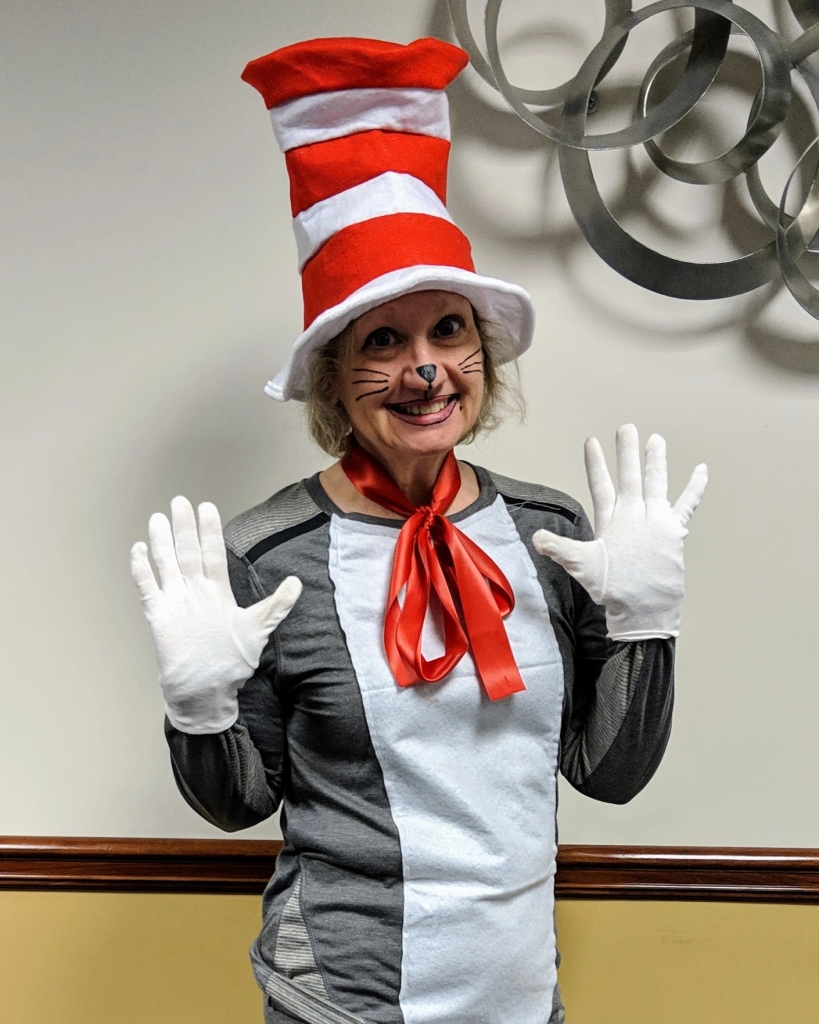Last January, I set my usual annual goal of reading an average of a book a week, or 52 books in a year. I met that goal with 67 books read or attempted. 10 of those books went into the “didn’t finish” category, so 57 books were read in full. Some of those were reviewed, but not many. I also included the plays I read or performed, because in my life, that counts.
One of my unstated 2019 goals was to read more non-fiction. Of the 67 books, six were non-fiction. Two of those were left unfinished: one was character research for a play, and the other was Women Rowing North by Mary Pipher. It wasn’t that I didn’t like Pipher’s book; I did, but I also felt like I was not the right age to read it yet. I got halfway through, and then turned it back in at the library. I’ll come back to it in a few years.
 Of the rest of the non-fiction, two were standouts.
Of the rest of the non-fiction, two were standouts.
First, Salt Fat Acid Heat by Samin Nosrat is hands-down the best cookbook I’ve ever read. The spouse and I were introduced to Ms Nosrat and her cooking through the Netflix series of the same title. We binged all four episodes in an afternoon, and I ordered the cookbook the same day. Ms Nosrat is utterly delightful in both the show and the book. She thoroughly explains why and how the four elements of her title are critical to good cooking, and how they all work together to create sumptuous savories and sweets. My cooking has definitely improved, thanks to this book.
 The other knockout non-fiction title actually scared the pants off me, as its title might suggest: Fear: Trump in the White House by Bob Woodward. Now, it’s no secret my politics lean leftward, and I have always thought Donald Trump was an asshole, dating from wayyyyy back in the 80s when he made such a splash on the gossip pages with his marriages, affairs, and failed business dealings, but I think anyone who approaches this book with an open mind and a respect for Woodward’s reporting will come away absolutely terrified that such an unqualified, incurious, hate-mongering, self-dealing, anti-intellectual, prevaricating dipshit currently holds the highest office of the land. But it’s 2020, election year; maybe the rest of the country has learned its lesson by now. We’ll find out in November, if the Senate doesn’t remove him from office first (not holding my breath on that happening, though).
The other knockout non-fiction title actually scared the pants off me, as its title might suggest: Fear: Trump in the White House by Bob Woodward. Now, it’s no secret my politics lean leftward, and I have always thought Donald Trump was an asshole, dating from wayyyyy back in the 80s when he made such a splash on the gossip pages with his marriages, affairs, and failed business dealings, but I think anyone who approaches this book with an open mind and a respect for Woodward’s reporting will come away absolutely terrified that such an unqualified, incurious, hate-mongering, self-dealing, anti-intellectual, prevaricating dipshit currently holds the highest office of the land. But it’s 2020, election year; maybe the rest of the country has learned its lesson by now. We’ll find out in November, if the Senate doesn’t remove him from office first (not holding my breath on that happening, though).
Okay, fiction-wise: I read some good stuff, but honestly, not many lingered in memory once I finished them. Here are the few that did.
 My friend Alice recommended The Name of the Wind by Patrick Rothfuss to me several years ago. This year I finally decided to act on that recommendation, and picked up the book at the library. Wow. In a tavern in a quasi-medieval society where magic (of course) is real, over a period of one night, or maybe two, the bartender and owner of the establishment tells a scribe the story of his life, starting with his wretched childhood and then his unlikely enrollment at the local university of magic. Along the way, we are given some hints as to our hero’s, um heroic past, and vague references to how he wound up as a humble tavern owner in hiding. This is the first of a series. As soon as I finished this one, I read the second book (and the series companion about a secondary character) in rapid succession, and currently await the next installment. However, I understand Mr Rothfuss is struggling with writing Book 3, and thus it is delayed. Hopefully we won’t wait as long for Book 3 from Mr Rothfuss as we’ve been waiting for Book 6 from George R.R. Martin.
My friend Alice recommended The Name of the Wind by Patrick Rothfuss to me several years ago. This year I finally decided to act on that recommendation, and picked up the book at the library. Wow. In a tavern in a quasi-medieval society where magic (of course) is real, over a period of one night, or maybe two, the bartender and owner of the establishment tells a scribe the story of his life, starting with his wretched childhood and then his unlikely enrollment at the local university of magic. Along the way, we are given some hints as to our hero’s, um heroic past, and vague references to how he wound up as a humble tavern owner in hiding. This is the first of a series. As soon as I finished this one, I read the second book (and the series companion about a secondary character) in rapid succession, and currently await the next installment. However, I understand Mr Rothfuss is struggling with writing Book 3, and thus it is delayed. Hopefully we won’t wait as long for Book 3 from Mr Rothfuss as we’ve been waiting for Book 6 from George R.R. Martin.
 As I’m sure you and the rest of the English-speaking world know by now, The Testaments by Margaret Atwood is the sequel to The Handmaid’s Tale. As I waited for my turn at the top of the library waiting list for The Testaments, I re-read The Handmaid’s Tale for the first time in probably 20 years. It’s still as horrifying as when I first read it back in the 1980s. The Testaments is equally as horrifying, albeit it a tad more hopeful. Telling the tale from the perspective of everyone’s favorite villain, Aunt Lydia, some 15 years after Offred got into the back of a van and vanished from the narrative, we dive into the inner workings of Gilead and learn, among other things, how Aunt Lydia came to her position of power. Things are not always as they seem in Aunt Lydia’s sphere of influence: even the Aunts play politics. I saw the twist coming, eventually, but enjoyed it nonetheless.
As I’m sure you and the rest of the English-speaking world know by now, The Testaments by Margaret Atwood is the sequel to The Handmaid’s Tale. As I waited for my turn at the top of the library waiting list for The Testaments, I re-read The Handmaid’s Tale for the first time in probably 20 years. It’s still as horrifying as when I first read it back in the 1980s. The Testaments is equally as horrifying, albeit it a tad more hopeful. Telling the tale from the perspective of everyone’s favorite villain, Aunt Lydia, some 15 years after Offred got into the back of a van and vanished from the narrative, we dive into the inner workings of Gilead and learn, among other things, how Aunt Lydia came to her position of power. Things are not always as they seem in Aunt Lydia’s sphere of influence: even the Aunts play politics. I saw the twist coming, eventually, but enjoyed it nonetheless.
 David Mitchell is on his way to becoming one of my favorite authors. I’d previously read and loved Cloud Atlas and The Bone Clocks, so when Slade House popped up on my radar, I grabbed it at the library at the first opportunity. The titular residence either exists or doesn’t exist, and is inhabited or abandoned, all depending on the time of day, the year, and one’s unique personality. Those who permitted to enter the grounds are forever altered. A fascinating take on the haunted house trope.
David Mitchell is on his way to becoming one of my favorite authors. I’d previously read and loved Cloud Atlas and The Bone Clocks, so when Slade House popped up on my radar, I grabbed it at the library at the first opportunity. The titular residence either exists or doesn’t exist, and is inhabited or abandoned, all depending on the time of day, the year, and one’s unique personality. Those who permitted to enter the grounds are forever altered. A fascinating take on the haunted house trope.
My friend Jenny says Black Swan Green is her favorite David Mitchell novel. Since I’ve yet to be disappointed in anything Mr Mitchell has turned out, I think I’ll put that one on the list for this year.
Speaking of “the list,” for 2020, I’ve again set a goal of 52 books. This will include plays, of course, because I read a lot of them. In fact, I’m taking part in a challenge to read Shakespeare’s complete works this calendar year. The organizer has come up with a schedule that gets us through all the plays and the poetry between January 1 and December 31. Epic! Twelfth Night is up first. If you care to join in, visit The Shakespeare2020 Project and sign up.
And if you’re interested in the complete list of books read in 2019, click here.
















 Of the rest of the non-fiction, two were standouts.
Of the rest of the non-fiction, two were standouts. The other knockout non-fiction title actually scared the pants off me, as its title might suggest:
The other knockout non-fiction title actually scared the pants off me, as its title might suggest:  My friend Alice recommended
My friend Alice recommended  As I’m sure you and the rest of the English-speaking world know by now,
As I’m sure you and the rest of the English-speaking world know by now,  David Mitchell is on his way to becoming one of my favorite authors. I’d previously read and loved
David Mitchell is on his way to becoming one of my favorite authors. I’d previously read and loved